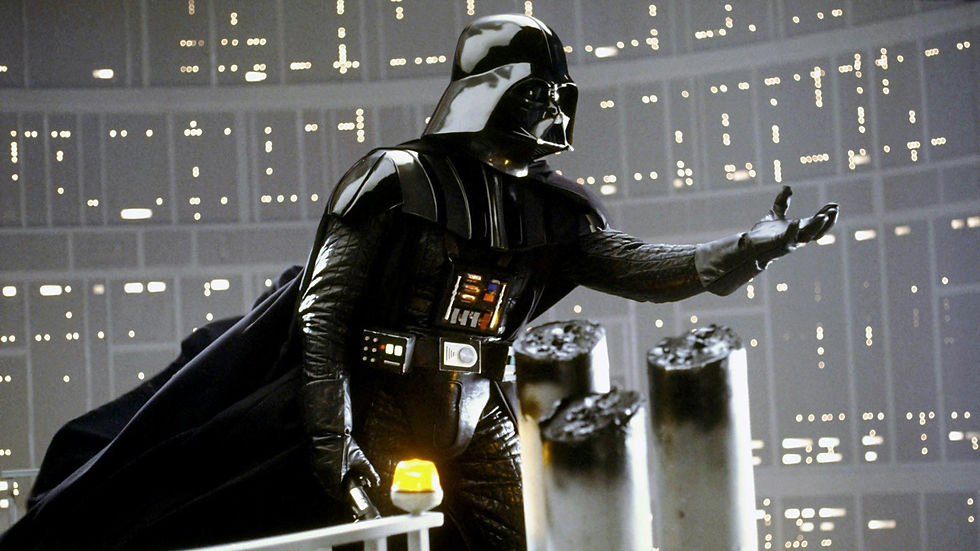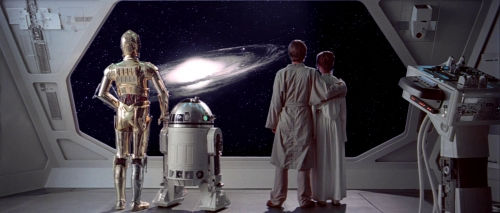The Empire Strikes Back (1980)
- Soames Inscker

- Apr 28, 2025
- 6 min read
Updated: Jun 8, 2025

Introduction
"The Empire Strikes Back" (1980), directed by Irvin Kershner and written by Lawrence Kasdan, is not only a milestone in the Star Wars franchise but also a cinematic achievement that stands as one of the greatest sequels ever made. Building upon the foundations set by George Lucas’s groundbreaking Star Wars: A New Hope (1977), The Empire Strikes Back takes audiences deeper into the galaxy far, far away, presenting darker tones, more complex character development, and higher stakes. Often lauded as the finest entry in the Star Wars saga, the film continues to resonate with audiences for its deep themes, stunning visuals, and iconic moments that have solidified its place in pop culture history.
Released three years after A New Hope, The Empire Strikes Back expands the universe established in the original film while taking the story in bold new directions. With a mix of thrilling action, emotional depth, and a cliff hanger ending, the film raised the bar for what a blockbuster could achieve both in terms of storytelling and technical achievement.
In this review, we’ll explore the film's plot, performances, direction, cinematography, themes, and its enduring impact on popular culture.
Plot Overview
The Empire Strikes Back picks up several years after the events of A New Hope. The Rebel Alliance, now on the run after the destruction of the Death Star, has established a secret base on the icy planet of Hoth. As the Empire continues its relentless pursuit, the story shifts between multiple threads.
Luke Skywalker (Mark Hamill), now a seasoned Jedi-in-training, begins to discover more about his connection to the Force, under the mentorship of the wise Jedi Master Yoda (Frank Oz), who resides on the remote planet of Dagobah.
Meanwhile, Han Solo (Harrison Ford) and Leia Organa (Carrie Fisher) are pursued by the Empire, with Han’s past catching up to him in the form of a bounty hunter named Boba Fett (Jeremy Bulloch), who is tasked with capturing Han.
Darth Vader (David Prowse, voiced by James Earl Jones), the film’s central antagonist, intensifies his hunt for the Rebels, while also dealing with his own personal revelations about his past.
In the film’s most famous plot twist, Vader reveals a stunning secret to Luke in a climactic lightsaber duel that has become one of the most iconic moments in cinema history.
The film’s multi-layered narrative is punctuated by high-action set pieces, including battles on Hoth, tense confrontations with Vader, and a final sequence that leaves the characters in peril, setting up the eventual conclusion in Return of the Jedi (1983).
Direction and Cinematography

Irvin Kershner’s Direction
While George Lucas served as executive producer, Irvin Kershner was entrusted with the direction of The Empire Strikes Back, marking the first time Lucas had handed over the reins of a Star Wars film to another director. This decision proved to be crucial in shaping the film’s distinctive tone.
Kershner, known for his work on films like The Eyes of Laura Mars (1978), brought a more nuanced approach to the franchise, emphasizing the emotional arcs of the characters and their relationships. Where A New Hope was a relatively straightforward hero’s journey, The Empire Strikes Back delves deeper into the complexities of its protagonists and explores their vulnerabilities, making the stakes higher and more personal.
Kershner’s handling of the film's pacing is another standout. The story moves between various subplots—each filled with moments of introspection, action, and confrontation—without ever feeling disjointed. The film balances slower, more reflective moments, like Luke’s training with Yoda, with larger, more intense sequences like the Battle of Hoth, creating a rhythm that makes the experience gripping from beginning to end.
Cinematography by Peter Suschitzky
The film's visual design, led by Peter Suschitzky (director of photography), is nothing short of spectacular. The stark, snow-covered landscapes of Hoth set a sombre tone for the beginning of the film, and the use of natural light in these scenes adds to the desolate and cold atmosphere, mirroring the Rebels' fight for survival. The transition to Dagobah, with its dense swamps and misty atmosphere, is visually jarring but effective in presenting Luke’s journey into the unknown, both physically and emotionally.
The film also uses its expansive settings—such as the frozen wastelands of Hoth and the shadowy, cave-like interiors of Cloud City—to evoke a sense of isolation and impending danger, which serves to enhance the emotional and psychological stakes for the characters. The use of practical effects and miniatures is masterful, and the set design is detailed, from the interior of the Rebel base to the towering structures of Cloud City, enhancing the immersion.
Performances

Mark Hamill as Luke Skywalker
Mark Hamill’s portrayal of Luke Skywalker in The Empire Strikes Back shows significant growth from his performance in A New Hope. Luke is no longer a wide-eyed farm boy, but a young man torn between his desire to become a powerful Jedi and his growing awareness of the consequences of his choices. Hamill expertly conveys Luke’s internal conflict, balancing his determination to succeed with the fear of failure, especially when confronted by the revelation of his true parentage. His performance is grounded, providing emotional depth to what could otherwise have been a straightforward hero’s journey.
The film's standout moment for Hamill is undoubtedly the duel with Darth Vader, where Luke faces his own fear, his lineage, and the crushing weight of his destiny. Hamill’s raw emotion during this sequence—particularly in the moment of realization—is iconic, cementing his place as one of cinema's most enduring heroes.
Harrison Ford as Han Solo
Harrison Ford's Han Solo in The Empire Strikes Back is a natural evolution of the smuggler turned reluctant hero. Ford injects Han with a perfect mix of swagger, charm, and vulnerability, and in this film, we see a more complex side to his character. His love for Leia becomes a central emotional thread in the story, with the growing tension between the two culminating in one of the franchise’s most famous moments: Han’s coldly delivered line, “I know,” before he is frozen in carbonite.
Ford’s comedic timing is also present throughout the film, offering lighter moments that provide balance to the heavier emotional content. Han Solo's ultimate fate at the end of the film—his capture by Darth Vader—leaves the audience yearning for his return, making the final instalment of the trilogy all the more anticipated.
Carrie Fisher as Leia Organa
Carrie Fisher’s portrayal of Princess Leia is a standout performance in The Empire Strikes Back. In this film, Leia is not just a leader in the Rebel Alliance, but a woman with real emotional depth. Fisher continues to show Leia’s intelligence, strength, and resilience while also exploring her vulnerability, particularly in her evolving relationship with Han Solo. The chemistry between Fisher and Ford adds emotional weight to the film, with their back-and-forth dynamic being both humorous and heartfelt.
Leia’s ability to hold her own in intense action sequences, as well as her unwavering commitment to the cause, cements her as one of the strongest female characters in cinema. The film ends with Leia in a position of uncertainty, giving Fisher’s portrayal an emotional arc that resonates with audiences long after the credits roll.
James Earl Jones as Darth Vader
While David Prowse physically portrayed Darth Vader, it is James Earl Jones's iconic voice that brings the character to life. Jones’s booming, resonant voice has become synonymous with Vader, and in The Empire Strikes Back, his vocal performance takes on an added level of gravitas. The depth of Vader’s villainy is matched by his personal struggle, especially as he makes the shocking revelation to Luke that he is, in fact, his father. Jones’s delivery of the famous line, “I am your father,” has been etched into cinematic history, forever changing the trajectory of the Star Wars saga.
Themes and Narrative
The Hero’s Journey Reversed
While The Empire Strikes Back continues the archetypal hero’s journey, it takes a darker, more complicated turn. Luke’s path to becoming a Jedi is no longer a straightforward narrative of heroism, but one marked by self-doubt, failure, and a realization of the enormous sacrifices required for victory. This film deepens the complexity of Luke's character, especially in the wake of his failure in his confrontation with Vader, where he is forced to accept the truth about his parentage.
The film also explores the cost of heroism. Han Solo's decision to help the Rebellion and risk his life for Leia and the others demonstrates the difficult choices faced by all the characters, making their victories seem harder-won and more significant.
The Nature of Power and Identity
The theme of identity is central to The Empire Strikes Back. Luke's discovery of his lineage challenges his understanding of who he is, and he is forced to reconcile his destiny with his sense of self. Similarly, Vader’s own internal conflict about his identity becomes more apparent, particularly in his relationship with his son. The film suggests that power is not simply about force but about knowing one’s true self and accepting the consequences of that knowledge.
Conclusion
The Empire Strikes Back stands as a masterpiece of cinema, blending action, emotional depth, and philosophical themes into a compelling whole. It is a film that transcends the genre of science fiction and adventure, delving into the complexities of identity, loss, and the burden of destiny. With exceptional direction by Irvin Kershner, a memorable cast of characters, and the timeless, game-changing revelation of Darth Vader’s true identity, The Empire Strikes Back remains an essential part of the Star Wars saga and a benchmark for what blockbuster filmmaking can achieve.

It is not merely a sequel, but a superior work that deepens the narrative, character arcs, and mythos established by A New Hope, cementing The Empire Strikes Back as one of the most influential and beloved films of all time.




